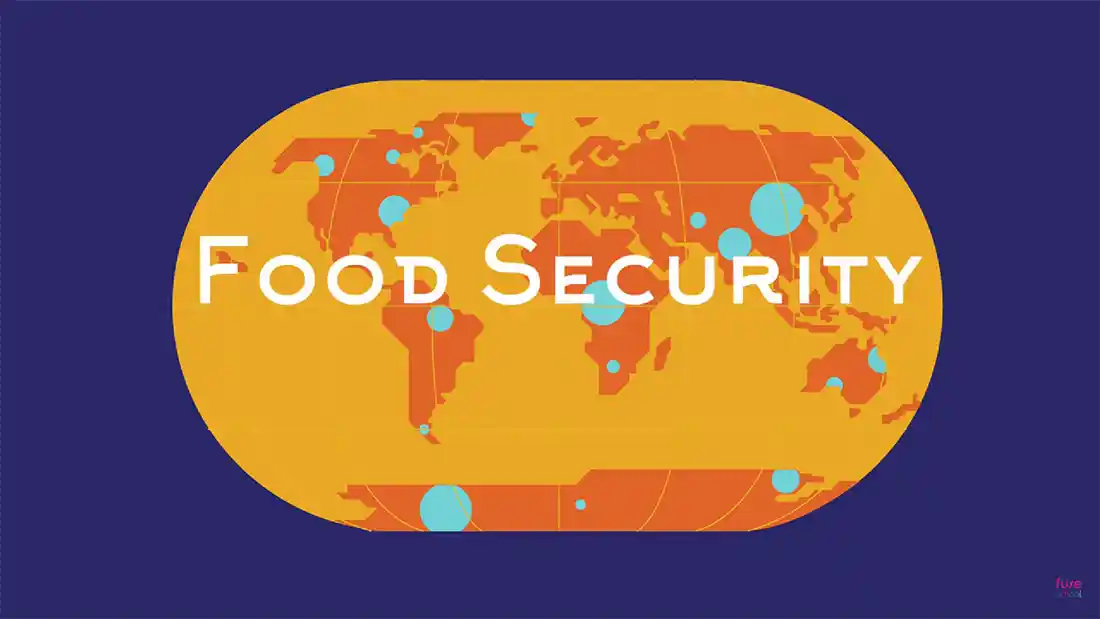

Food, security, famine, pests, pathogens, climate change, birth rates, farming, war, conflict, cultures.
As we go on year by year, and more and more people live on this planet, we need to maintain the amount of food we use, eat, or have access to. We do this by securing an amount of food for each country.
But what does that actually mean, and what factors affect it?
When we talk about security, we don't necessarily think about our food. We go to a supermarket to buy fresh products (strawberries all year round, milk in the fridge daily), and without a blink of an eye we don't think of where it's come from, or how much of it we want. But what about those that can't afford it? How do they get what they need?
The idea of food security is to provide each human in a country with enough staple foods to survive each day. This includes staples like water, basic foods like bread and butter, as well as luxuries like chocolate and wine.
How does what we do during the year affect this security, as well as freak acts of nature?
If you look out the window, you can most likely see a field. If not, then surely you are around 5 minutes away from one. Especially in the UK, we have access to many fields in the country. Some are used for farming animals like sheep, cows and horses. Others are used for farming plants like rapeseed or sunflower (which produce oils), borage, wheat and barley (used in breads and other wheat derivatives), and other products.
Putting exports aside for a minute, as we do a lot of it, if as a country we were to keep our own products that we grow and create, we could survive fairly well on what we make. There should be enough space in fields, etc.
So why do we export materials out of the country? Well, simple. We trade with other countries to get other products into the country. We grow strawberries that are good for about 3 months of the year, but what about in the middle of January, when there is no Sun on our land? So, we export materials to other, hot countries like Egypt and Spain, and they send us strawberries back. Obviously, there's more to it than that, but you get the idea.
The following still is from a video on trophic levels, with the following details:
Please click on the image to view the video.

Biological threats: there are plenty of biological threats that can impact plants and animals that we grow for use in foods. Pests, pathogens and infections can enter the ecosystems of these and cause lack of growth, or infect so they can't be used.
Climate change: it's one of the most talked about subjects, and there's strong evidence that it happens. Whether you choose to believe that it is true is up to you, but climate change affects food security. It can mean either that there are not enough crops grown for everyone to have, or it can be too hot or cold and destroy those crops so no one has access to them.
Weather: inclements of weather (drought, too much rain, snow) can affect how much food is produced. It can also have an effect on the animals that we rear for use as food too.

In the Middle East, a grain storage was uncovered that is as old as 10,000 years old. Even they were aware of food security in case of a drought or some other factor.
Rising costs: we all know about these too, with a cost of living crisis currently happening in the UK. With the rising costs of everything - electric, gas, water, heating - many businesses struggle to pay for those basic amenities as they cost so much already, and so may not continue business. This has an effect on the security of everything.
Conflict: if there's a war going on somewhere (like that of Ukraine currently), you can bet that there is a danger to the food security. Conflicts of past, like World War Two, can still have an effect on modern times. During World War Two, there was a major shortage, and people had to be rationed until as late as 1954.
Innovative ways are being researched and implemented to help drive down costs, or to help provide more and more foods to us. This goes right down to manipulation under the microscope (genetically modified food), to anything else like increasing the amount of land used to grow crops, etc.
With changes in cultures happening at a growing rate, the sustainability of foods becomes uncertain. This is due to how much food is produced to cope with the change, how sudden the change is, and also other factors surrounding the changes.
Disclaimer | About Me | Sitemap
Website design by SyntaxHTML.



Blue icons adapted from icons courtesy of Smashicons.com